Connecting Belizean Women to Their African Heritage
The 2024 Miss African Queen Pageant is just a few days away and this year six contestants are making their final preparations for the big day. The annual event is meant to bring Belizean women closer to their African roots by allowing them to embrace the physical traits linking them to the continent and highlights aspects of various cultures through clothing and dance. In this week’s episode of Kolcha Tuesday, we explore the cultural ties between Belizeans and their African heritage.
Britney Gordon, Reporting
For many Belizeans, the word Creole can refer to several aspects of one’s identity. It may be the language, or a signifier of one’s skin color among the mixture of races and ethnicities found in the country. No matter how it is used, the origin of the word refers to those who were born in a country that is not their parents’ homeland. This is the legacy of the slaves that were brought to the Caribbean from West Africa. And this is the heritage that the Miss African Queen Pageant seeks to highlight every year. Maryam Abdul-Qawiyy, spokesperson for the Miss African Queen Contest, tells us more.
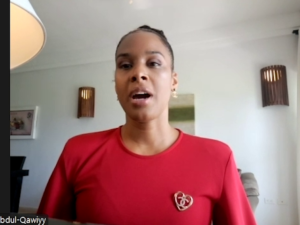
Maryam Abdul-Qawiyy
Maryam Abdul-Qawiyy, Spokesperson, Miss African Queen Contest
“Being here in Belize, we are a melting pot of cultures of Creole, Garifuna, Maya, Mestizo, and we also have our Mennonites as well and our diplomats and people who come to live here from all over the world. We love all our cultures, but the main four Belizean cultures that are here are black and brown people and this pageant came about for especially the Creole to celebrate their heritage and the creole people are a part of the African diaspora. These were people who were enslaved so it’s about recognizing self where you’re from that’s why it’s called miss African queen because all black peoples are coming from the continent of Africa.”
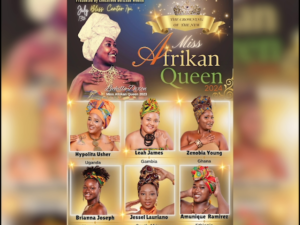 According to Abdul-Qawiyy, the contest was created to fill a gap in pageantry and celebrate women who break away from Euro-centric beauty standards. Leah James, a contestant representing The Gambia, says that she entered this year’s competition so that her young daughters appreciate African beauty and be reminded of their heritage. We ask what it means for her as a black Belizean woman to represent this part of history.
According to Abdul-Qawiyy, the contest was created to fill a gap in pageantry and celebrate women who break away from Euro-centric beauty standards. Leah James, a contestant representing The Gambia, says that she entered this year’s competition so that her young daughters appreciate African beauty and be reminded of their heritage. We ask what it means for her as a black Belizean woman to represent this part of history.
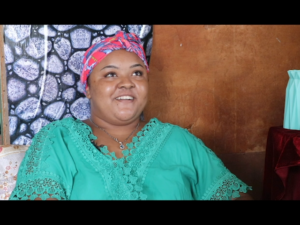
Leah James
Leah James, Contestant
“I’m going to be very honest with that. If you had asked me that six, seven years ago, I would not be able to give an answer that would really resonate with my heart. But after having my first child. Her having her curl here all those coils all of that that is what made me realize that you know what? Despite my skin color I might be lighter than others but it’s still in me and I need to be proud of it not only for myself but for her because she needs to feel proud of herself she needs to feel like that pride because they’re girls they’re gonna look up to somebody they need someone to look up to so I’m ensuring that My pride shows true that they can see that okay you have someone to look up to.”
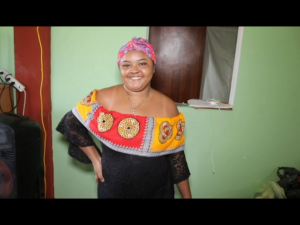 To connect with her costume, James decided to create elements of it by hand, such as her headpiece and parts of her dress. We caught up with fellow contestant, Hypolita Usher, who will be representing Uganda, as she was gathering the finishing elements for her attire. Uganda is a landlocked country located in East Africa, famous for its biodiversity and being the source of the Nile River. Uganda is also known for its relatively high birth rate, displaying on average four point five eight children per woman. Usher explains that the reason she chose to embody Uganda is because she could see herself represented among the features of the women of that nation.
To connect with her costume, James decided to create elements of it by hand, such as her headpiece and parts of her dress. We caught up with fellow contestant, Hypolita Usher, who will be representing Uganda, as she was gathering the finishing elements for her attire. Uganda is a landlocked country located in East Africa, famous for its biodiversity and being the source of the Nile River. Uganda is also known for its relatively high birth rate, displaying on average four point five eight children per woman. Usher explains that the reason she chose to embody Uganda is because she could see herself represented among the features of the women of that nation.
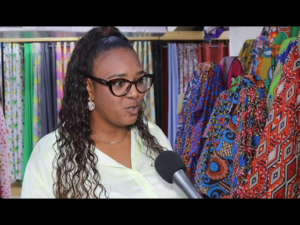
Hypolita Usher
Hypolita Usher, Contestant
“It was really hard choosing Uganda for the simple fact that all the countries I’ve read up on, they have so much to offer. However, what stuck with me with them was that, if Africa on a whole, they love full figured women, but Uganda specifically, there’s a tribe living in the woods who prefer it, who groom their children to be thicker women, and they are listed as the tallest people in the world. So I said, look at that, I’m full figured, I’m tall. So that’s what made me really go with Uganda.”
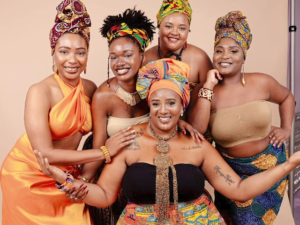 The goal of the pageant is to bridge the gap between the African continent and Belize. Abdul-Qawiyy, a former Miss African Queen herself, acknowledges the similarities between Egyptian and Belizean dance. By participating, every contestant leaves with a stronger connection to their chosen country.
The goal of the pageant is to bridge the gap between the African continent and Belize. Abdul-Qawiyy, a former Miss African Queen herself, acknowledges the similarities between Egyptian and Belizean dance. By participating, every contestant leaves with a stronger connection to their chosen country.
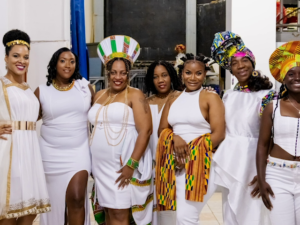 Maryam Abdul-Qawiyy
Maryam Abdul-Qawiyy
“One of our contestants this year, she’s representing Sierra Leone and she found that in Sierra Leone, there’s a similar name that we have here in Belize for one of our towns, the exact name. And not only that, but they also speak Creole. I don’t want to give away too much, but she will be explaining more in her different statements and her intro and all the delegates have found similarities between Belize and these African nations. And that’s what it’s all about, is to find these similarities, to recognize that our culture and our heritage is worldwide, and that it’s important for reeducation of self.”
The African ancestry that ties Belize to the rest of the Caribbean may not be at the forefront of the mind of Belizeans, but it is something that flows within their veins. It can be seen in the fishing and agricultural communities, finding resourceful ways to survive. It can be heard in the language and music that connects people of various ages, and it is felt in the community that comes together to celebrate what it means to call themselves Belizeans. Britney Gordon for News Five.






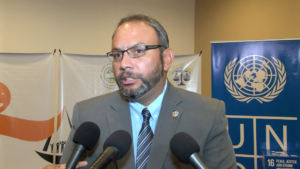
Facebook Comments